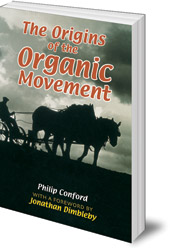Quick Look
An authoritative history of the twentieth century green movement, this book traces the evolution of this thriving culture.
Description
With recent media hysteria and public concern about BSE and genetically-modified crops, we could be forgiven for thinking that the upsurge of interest in organic farming is a reflection of modern debate, and a vindication of what left-wing alternative groups have been advocating for years.
However, in this first and authoritative history of twentieth century "green" culture, Philip Conford reveals that the early exponents of the organic movement actually belonged more to extreme right-wing, conservative groups, which were reacting to industrialization and the increasing threat to traditional country life, closely associated with socialist politics.
Drawing on a wealth of contemporary sources, Conford chronicles the origins of the organic movement in Britain and America between the 1920s and 1960s, and offers a perceptive portrayal of an organization which believes implicitly in the positive acceptance of the natural order and its laws. The author demonstrates convincingly that organic farming is not a recent issue, and traces the evolution of this now thriving movement.
With the recent EU directive banning animal products in animal feed, together with the public backlash against genetically-modified crops, this book provides powerful reinforcement to a debate that has raged for over a century, and which affects us all.
Reviews
'This is an excellent book ... the underlying issues are the most crucial of our time... fine and valuable read.' -- The Independent
'This is a fascinating and authoritative account of the organic pioneers, whose vision and research have shaped our present movement. For anyone interested in organic farming, it's a must.'
-- Patrick Holden, Director of the Soil Association
'At last, a thoroughly researched history of the organic movement! Jonathan Dimbleby's introduction sets the tone ... this book is authoritatively researched, with extensive glossaries and appendices. This book is alive with inspiration.'
-- Ysanna Spevack, Organicfood.co.uk, Spring 2003
'A timely and very important contribution for the vital current debate on the future of agriculture and rural livelihoods, not only in the UK but worldwide.'
-- Dr John Wibberley, FRAgS
'For people like me and for many others within the organic movement, this book is a long-awaited and much needed exposition. I've been particularly excited to read about the earliest origins from around 1926. By detailing the contributions of each of the key players, it sets out, in possibly the best way ever done, what organic farming is and what it hopes to achieve. As such it's of major value to the Soil Association and I'll be arguing that it should be used whenever possible.'
-- Richard Young, Soil Association
'An invaluable guide to the hard facts behind the Organic Movement written in a clear and concise style.' -- Worcester Evening News
'Fluent, humane, elegant and beautifully balanced.' -- Rural History Journal
'Conford has written an excellent and very readable book. A fine reference work. If you want a good example of "straight" environmental history writing, read this book.'
-- Organization and Environment, March 2003
'This delightful volume contains a treasure trove of unusual information linked to inspired amd determined people'.
-- The Food Magazine, July/Septmber 2007
Author
Dr Philip Conford is a writer, broadcaster and teacher, who obtained his doctorate through research into the history of the organic movement. He edited The Organic Tradition and A Future for the Land, and wrote The Personal World: Self and Society in the Thought of John Macmurray.
You can also visit the author's own website at http://philipconford.wordpress.com/
Links
Also by Philip Conford, the next part of the story:
The Development of the Organic Network

